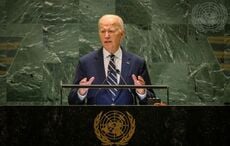An already depressing presidential campaign was rocked by the now infamous 2005 videotape showing Donald Trump delighting in his penchant for grabbing women’s genitals. His numbers in the polls have sunk especially after Michelle Obama flattened him in her fiery speech.
Millions of men and women here in Ireland and across the globe are, finally, starting to breathe a collective sigh of relief as the chances of a Trump presidency fade. It is very likely that Hillary Clinton will be the next President of the United States.
But the reality is that the Electoral College math and a number of other factors always meant that it would be extremely difficult for any Republican candidate to prevail in 2016.
In order to have a chance at retaking the White House, the GOP must make some complex strategic decisions in the years to come. In short, the party needs to build bridges with Hispanics, African Americans and young people, while simultaneously holding onto the votes of the so-called “angry white males” and others who are its most steadfast supporters. That will be a herculean task.
There will be no shortage of thought pieces on the quandary facing Republicans after the election. In the shorter term, however, one more presidential debate remains – tonight. It will be moderated by Chris Wallace of Fox News and will feature six topics: debt and entitlements, immigration, the economy, the Supreme Court, foreign hot spots and fitness to be president.
Trump will doubtless argue for lower levels of spending on the first topic and again reference “extreme vetting” on the second. On the others, if I were given the all but impossible job of preparing him, following are the sound bytes that I would urge him to lead with and keep coming back to.
Economy:
“I’ve traveled throughout this great country for the past year and a half and met some wonderful people. Some of the best people I’ve come across have been in states that the elites on the coasts rather disparagingly say are part of the ‘rust belt’ or of the ‘deep South.’ To me, these states are the heartland of America and these men and women are the citizens who made this country great. And they’re hurting right now. They’re hurting bad.
"Why? Because the good jobs in manufacturing they had are gone. The once-mighty industrial base in this country has been decimated. Some of it is due to factors beyond our control, but not all of it. Secretary Clinton – and so many other politicians who claim to care – sold millions of our people out with their support of “free” trade deals that accelerated the exodus of American jobs to Mexico, to India, to China, etc.
"They cannot deny it; their votes and comments are a matter of record. It’s very sad to see the human toll of their decisions, which, I should add, have made a lot of people in the financial and business world very, very wealthy.
"You can bet that, as President, I will revisit existing trade deals, refuse to sign any more and will always put America and Americans – not the global economy and financiers – first.”
Read more: As the mother of a daughter with a disability, I fear for a Trump presidency
Supreme Court:
“It might not be the first thing that a lot of you watching take into account when you’re deciding who to vote for, but the Supreme Court is incredibly powerful and selecting a new Justice to serve on the Supreme Court is one the most important decisions a president can make. At this very moment, there are judges on the Supreme Court and other federal courts who don’t apply the law as it’s written, but how they wish it was written.
"And who are they to do that? Who elected them to make the law? I will only appoint judges who will apply the law as it is written and leave the lawmaking to our elected officials. Secretary Clinton has a very different view of what judges should and should not do. I think her view – and the view of other big-time liberals who like the idea of high-minded “wise men and women” deciding what the law says – is wrong. And it’s undemocratic.
"I’d also say that the Supreme Court is dominated by people who went to Ivy League law schools, clerked for other federal judges or taught at Ivy League law schools and have spent their lives in places like Cambridge, Massachusetts and Manhattan. I know many highly intelligent, hugely capable lawyers who’ve had quite different careers and experiences of the law and know exactly how it impacts the lives of ordinary people. I’d consider some of them if and when vacancies on the Court arise, too.”
Foreign hot spots:
“Before we get into talking about Aleppo or Russia or China or any of the other serious difficulties and conflicts confronting the world, let’s have a discussion about the United States and what our country’s vital national interests are, and what they aren’t. Secretary Clinton and many of our other politicians, as well as a lot of think tanks and powerful advocates in Washington, DC, define our vital national interests as if the first word, vital, weren’t there. They’ve endorsed military adventurism in Iraq and Afghanistan and – despite the fact that both were total failures – they continue to think that the United States should be the world’s policeman.
"I can tell you that most Americans, especially the countless military families I’ve met, disagree. So many of them, whose sons and daughters went off to the Middle East and came back, tragically, in caskets or with physical or emotional scars that might never fully heal, ask me why? They say, ‘for what?’ I don’t have a good answer for them – and I know that Secretary Clinton doesn’t either. I believe the safety of our people is our vital national interest – the safety both of those who protect us and of us lucky enough to have their protection. So that’s how I will approach every situation in every hot spot around the world.
"I have many endorsements from generals and other high-ranking military personnel. They know I’m right. But the majority of the foreign policy establishment – academics, lobbyists, alleged experts – can’t stand me. They say I’m too risky. I say look at what they and their “wisdom and expertise” have wrought upon the United States: failed interventions, loss of respect and a destabilised world.
"Again, they don’t care because they're not their kids, nor mine, nor Secretary Clinton’s who have been and will be the pawns in their global game. The pawns are millions of young men and women from hard-working families throughout this country who love it and want to serve it. I will never put them in harm’s way unless it’s absolutely necessary.”
Fitness to be president: “I stand here in this final debate of a campaign that’s gone on for a long time and I am still not a politician. I never intended to be a politician and never lived my life as if I would seek public office. I have definitely said and done some things in my life that I seriously regret, that no apology can fully be enough for. I’ve said some things in the course of this campaign that I regret.
"At times, I’ve gone too far and gotten too carried away. It’s not a question of if I’ve offended people. The fact is that I have. And I am profoundly sorry for doing so. The fact is that I love this country and I love the people of this country. That’s why I’m running for president. I want to do everything I can to help put it back on the right track. Unlike Secretary Clinton, I’m not going to try to tell you we’re on the right track. We’re not, and we have a lot of work to do to put things back together again. I know that, with your help, we can do it.”
~~~~~
Populism is the dominant theme in each of these sound bytes. Trump’s appeal has been built on it. When it comes to the role of America in the world and the future of the “American Dream,” he has struck a chord with a substantial segment of the electorate and with people of varying belief systems and backgrounds.
Unlike the leadership of both the Republican and Democratic parties, whose shared internationalist bent and relentless optimism suggest they are tone deaf and out of touch with the majority of men and women in the United States, Trump understands, at some level, that they’re in a bad place right now. That’s why he has exceeded all expectations in this race for the White House.
Trump won’t win. But the millions attracted to his message – and many of those on the political left who were inspired by the more benign, yet not wholly dissimilar, vision articulated by Bernie Sanders – await more perfect candidates. No matter what happens on November 8, American politics will be different after 2016. “Americanism vs. Globalism” will likely be as much a dividing line as “left vs. right.”
* Larry Donnelly is a Boston attorney, a Law Lecturer at NUI Galway and a political columnist with IrishCentral.com and TheJournal.ie.
Read more: Michelle Obama to make a run for top office after White House?




Comments